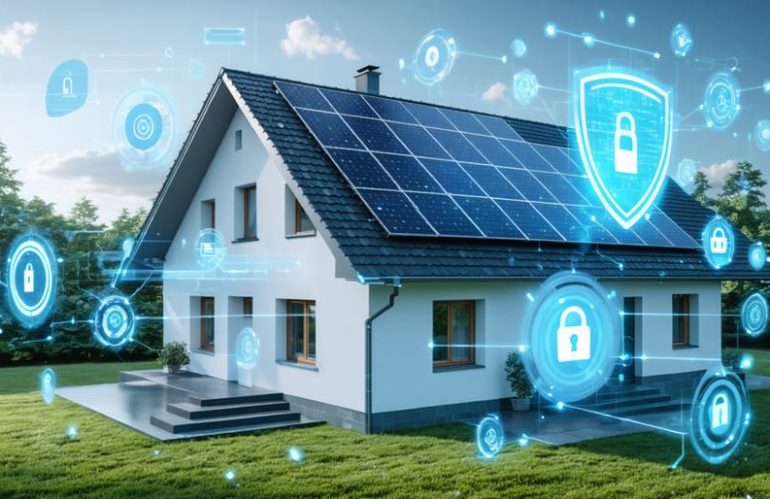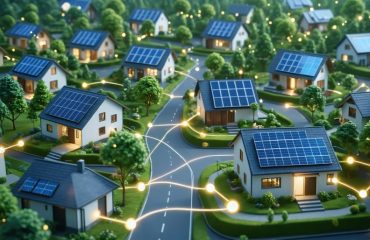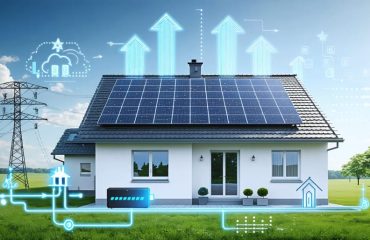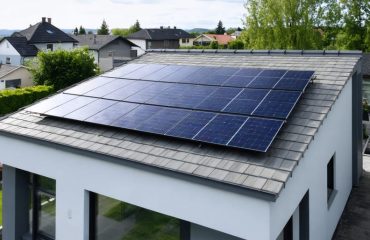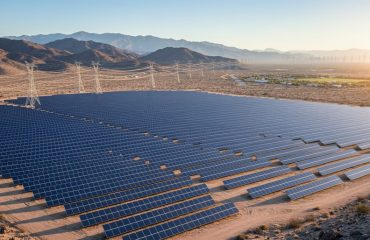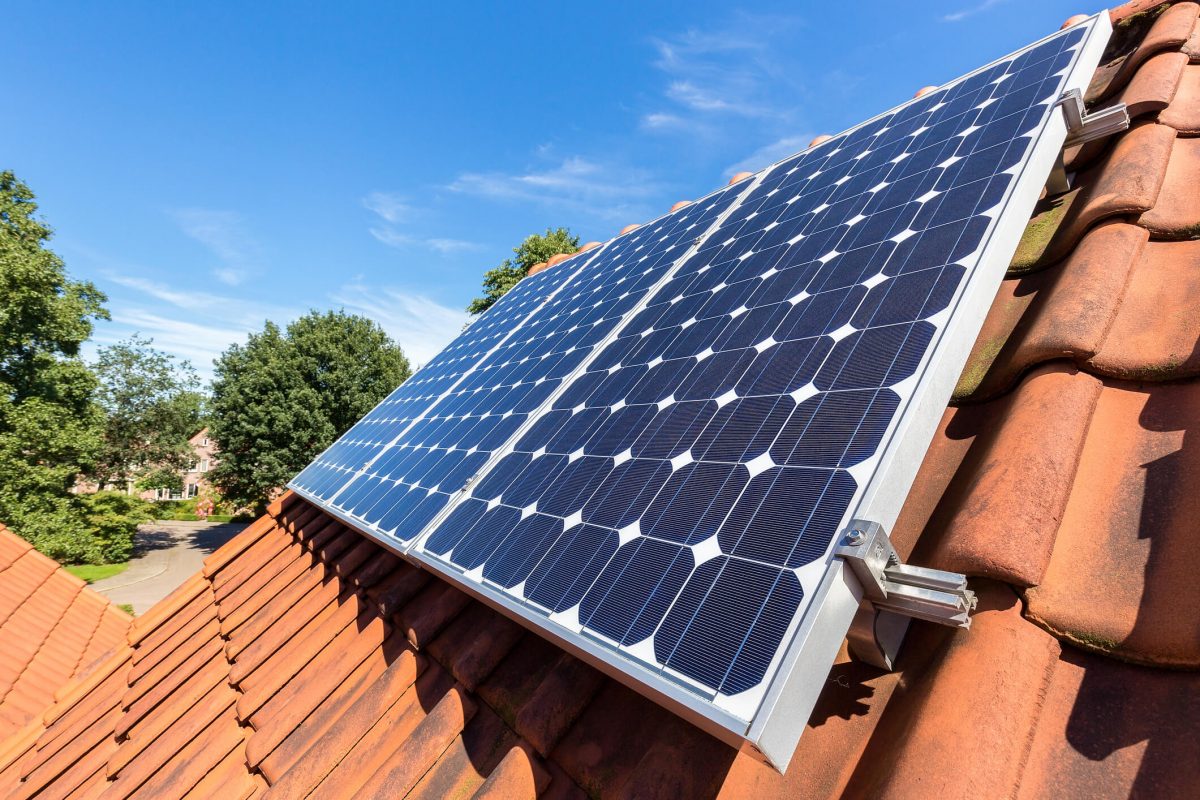In an era where energy security intersects with digital threats, the Office of Cybersecurity, Energy Security, and Emergency Response (CESER) stands as America’s frontline defense for our critical energy infrastructure. As solar installations and smart grid technologies become increasingly common in homes across the nation, CESER’s role in helping protect your solar investment has never been more vital.
This Department of Energy division works tirelessly to safeguard the nation’s power grid from cyber threats, ensuring that millions of homeowners can reliably harness solar energy without fear of system compromise. By implementing robust security protocols, conducting real-time threat monitoring, and coordinating rapid response measures, CESER creates a protective shield around our energy infrastructure – from utility-scale power plants down to individual home solar installations.
For homeowners embracing clean energy solutions, CESER’s work translates into enhanced reliability, stronger data protection, and greater peace of mind. Understanding their role helps consumers appreciate the multiple layers of security protecting their energy investments and supporting America’s transition to a more resilient, sustainable power grid.
Understanding CESER’s Mission in Home Energy Security
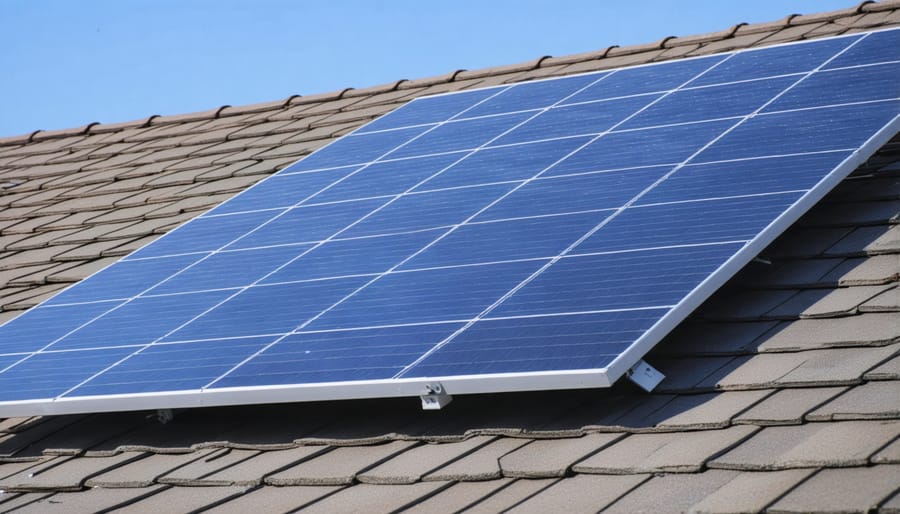
Key Protection Measures for Your Solar Storage System
CESER recommends several key measures to protect your home solar storage system from cyber threats. First, ensure your system uses strong, unique passwords and enable two-factor authentication when available. Regularly update all system software and firmware as manufacturers release security patches. Install and maintain reputable cybersecurity software on any devices connected to your solar system’s monitoring platform.
Create secure, separate networks for your solar equipment, keeping them isolated from your home’s main WiFi network. This adds an extra layer of protection against potential breaches. Monitor your system’s performance regularly and investigate any unusual patterns in energy production or consumption, as these could indicate unauthorized access.
Work with certified installers who follow CESER’s cybersecurity guidelines and maintain proper documentation of all system modifications. Consider installing physical security measures like locked enclosures for critical components. Finally, maintain a backup power plan in case of system compromise, and keep emergency contact information for your installer and utility company readily available.
These preventive measures help ensure your solar investment remains secure while delivering reliable, clean energy for your home.
Real Benefits for Solar Homeowners
CESER’s work directly impacts solar homeowners by safeguarding their investment and ensuring reliable energy production. Through enhanced grid security measures, homeowners can trust that their solar systems will continue functioning effectively, even during potential cyber threats or grid disruptions. The organization’s monitoring and response capabilities help prevent unauthorized access to smart inverters and home energy management systems, protecting both your data and equipment.
For homeowners with battery storage systems, CESER’s protocols ensure seamless integration with the grid while maintaining security. This means you can confidently participate in grid services and energy-sharing programs, potentially earning additional income from your solar investment. The organization’s emergency response planning also helps solar homeowners maintain power during grid outages, maximizing the benefits of their backup power systems.
CESER’s initiatives extend to protecting smart meter data and ensuring accurate billing for solar production. This oversight helps homeowners receive fair compensation for excess energy sent back to the grid and maintains the integrity of net metering programs. By implementing these security measures, CESER helps create a more resilient and reliable clean energy future for solar homeowners.
Smart Integration of Security Features
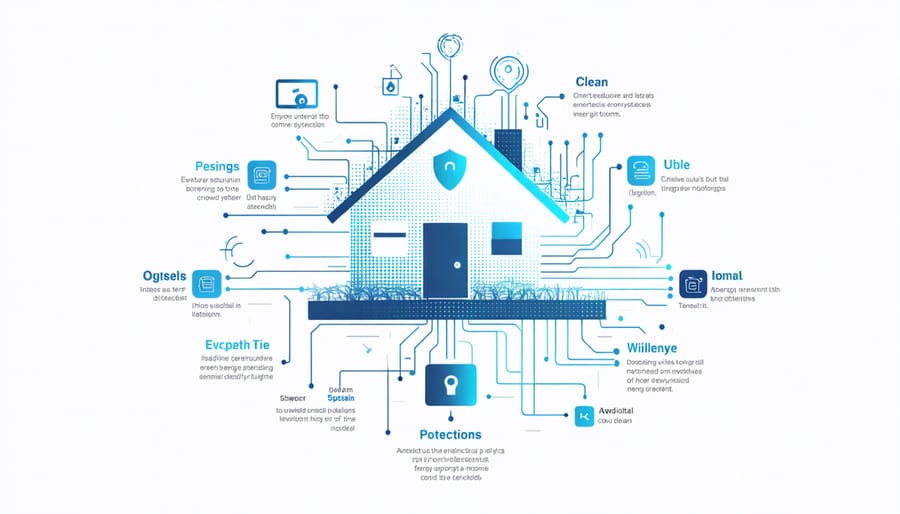
Securing Your Solar Battery Connection
Protecting your solar battery system from cyber threats is simpler than you might think. Start by implementing smart security for solar storage measures recommended by energy security experts. Change default passwords on your battery management system to strong, unique combinations. Regularly update your system’s firmware when manufacturers release security patches, just as you would update your smartphone.
Keep your battery’s monitoring system on a separate network from your home’s main WiFi, and ensure all remote access features are protected with two-factor authentication. Work with certified installers who follow cybersecurity best practices and maintain proper documentation of all system configurations.
Consider installing a dedicated firewall for your battery system and regularly back up your settings. Many modern solar batteries come with built-in security features – make sure these are activated and properly configured. By following these straightforward steps, you can enjoy the benefits of solar storage while keeping your system secure from cyber threats.
Safe Grid Connection Standards
Connecting your home’s energy system to the grid requires adherence to strict safety standards designed to protect both your installation and the broader power network. These standards ensure that your system operates safely and efficiently while maintaining grid stability. Key requirements include the installation of approved inverters with anti-islanding protection, which automatically disconnects your system during power outages to prevent backfeeding.
Modern grid connection standards also mandate the use of smart meters and monitoring systems that can detect and respond to potential security threats. These devices help prevent unauthorized access and ensure your system only connects to verified grid components. Additionally, all equipment must meet UL certification requirements and comply with IEEE 1547 standards for interconnection.
To maintain ongoing security, regular system updates and inspections are essential. Your installer should provide documentation confirming compliance with local utility requirements and national safety standards. This includes proper grounding, surge protection, and emergency shutdown capabilities. By following these standards, you’re not just protecting your investment – you’re contributing to a more resilient and secure energy grid for everyone.
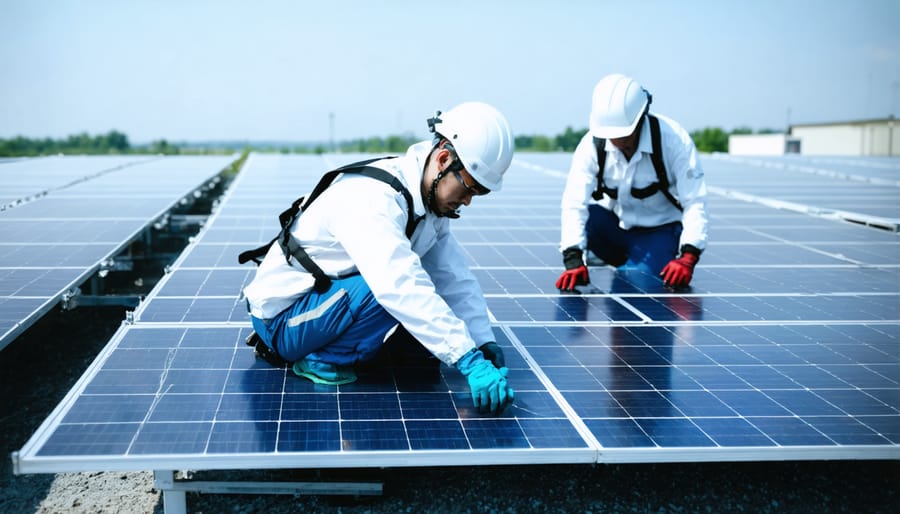
Emergency Response and Your Solar System
When emergencies strike, CESER’s advanced response protocols ensure your solar investment remains protected and operational. The agency maintains a comprehensive monitoring system that constantly watches for potential threats to residential solar installations, from severe weather events to cyber attacks.
During crisis situations, CESER activates its Emergency Support Function #12 (ESF-12), which coordinates directly with local utilities and solar providers to maintain or quickly restore power to solar-connected homes. This means your solar system has an extra layer of protection beyond your regular maintenance and warranty coverage.
The agency’s rapid response teams work around the clock to assess and address threats to solar infrastructure. They coordinate with state and local authorities to prioritize power restoration, ensuring that solar-powered homes can continue generating clean energy even during widespread outages. This includes deploying specialized technicians who can quickly repair damaged equipment and restore connections to the power grid.
CESER also provides real-time updates and guidance to homeowners during emergencies. Through their alert system, you’ll receive notifications about potential threats to your solar system and specific instructions on how to protect your investment. This might include recommendations for safely shutting down your system before severe weather or guidance on operating your solar panels during grid instability.
Additionally, CESER’s protocols include cybersecurity measures that protect your solar system’s smart components from digital threats. Their experts continuously update security protocols to guard against emerging risks, ensuring your solar investment remains secure and reliable for years to come.
Future-Proofing Your Solar Investment
As the solar energy landscape evolves, homeowners can take comfort in knowing that their investment is protected by advancing security measures. The Office of Cybersecurity, Energy Security, and Emergency Response (CESER) is implementing several forward-thinking initiatives that will benefit residential solar users for years to come.
One key development is the integration of advanced encryption protocols for solar inverters, making it increasingly difficult for unauthorized access to your home’s energy systems. These protocols work alongside smart battery monitoring systems to ensure your solar setup remains secure while maximizing efficiency.
The upcoming Security-by-Design framework will require solar equipment manufacturers to build security features directly into their products, rather than adding them as afterthoughts. This proactive approach means that future solar installations will come with built-in protection against cyber threats, saving homeowners both time and worry.
CESER is also developing a nationwide alert system that will notify solar system owners about potential security risks and provide immediate guidance for protecting their equipment. This real-time communication network will help homeowners respond quickly to emerging threats while maintaining optimal system performance.
Additionally, new certification standards are being introduced for solar installation companies, ensuring that everyone who works on your system follows strict security protocols. This comprehensive approach to security gives homeowners peace of mind while supporting the long-term reliability of their solar investment.
These initiatives demonstrate CESER’s commitment to protecting residential solar systems while making security measures more accessible and user-friendly for homeowners. As these programs roll out, solar users can expect enhanced protection without sacrificing the convenience and efficiency that makes solar energy so appealing.
CESER’s dedication to protecting residential solar investments represents a crucial partnership between government and homeowners in building a more secure and sustainable energy future. By maintaining robust cybersecurity measures and offering guidance to solar system owners, CESER helps ensure that your clean energy investment remains safe and reliable. As solar technology continues to evolve, staying informed about security updates and best practices becomes increasingly important. Homeowners can take comfort in knowing that CESER works tirelessly behind the scenes to protect their solar installations while supporting the growth of renewable energy across America. By working together and staying vigilant, we can maintain the security of our residential solar systems while enjoying the benefits of clean, sustainable power for years to come.

